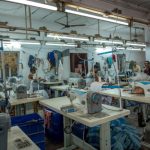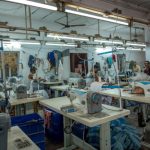Sydney Court Hears Sexual Slavery Allegations

It is alleged that a Thai sex worker was spat on and repeatedly struck by her Sydney clients, then directed to “just put up with it” by the woman she lived with. The complainant was allegedly told she had to engage in a gruelling schedule of sex work in order to pay off a supposed $45,000 debt.
57-year old Rungnapha Kanbut is on trial in Downing Centre District Court after pleading not guilty to six offences, including possessing a slave under section 270.3 of the Criminal Code Act 1995 (Cth), which carries a maximum penalty of 25 years in prison.
The complainant testified that the $45,000 took her “months” to pay back, and that she was never told why she owed it in the first place. She earned $500 cash or more on average each day, and that Ms Kanbut took the rest.
She said she was allowed to keep tips of “sometimes $5, sometimes $10” for herself, and that her family in Thailand was sent $1000 by Kanbut on her behalf each month.
Defence barrister Jeffrey Clarke said there were issues with some of the women’s allegations, but overall “the real issue here is whether or not what is being described by these witnesses amounts to slavery”.
The trial continues before Judge Nannette Williams and a jury of twelve.
Slavery in Australia
However, this certainly isn’t the only recent allegation of slavery within our borders.
A Brisbane couple was sent to prison last year for exploiting a Fijian woman by trafficking her into the country and forcing her to work for them in conditions described as inhumane.
During the sentencing proceedings, the Judge remarked that the woman – who cannot be named for legal reasons – had her freedom taken away from her and other human rights “seriously compromised”.
The victim was trafficked into the country on a tourist visa by Brisbane couple, Malavine and Isikeli Pulini, who gave her several bogus promises about what she would be doing and her future prospects as a resident of Australia. But when the victim arrived, the couple took her passport and forced her to work as a nanny, maid and cook around the clock until her escape in 2016.
For a total of eight years, the woman was paid about $250 per fortnight, and there were she was not paid for many weeks.
The couple pleaded guilty to harbouring an illegal non-citizen in Brisbane District Court, and a jury later found them guilty of forced labour offences.
Mrs Pulini was also convicted of an additional human trafficking offence.
She was sentenced to a total of six years prison while Isikeli was sentenced to five years, both with a two-year non-parole period.
In handing down the sentence, the Judge noted the pair had tried to enhance their quality of life by oppressing the victim and had shown no remorse for the years of abuse.
Slavery laws in NSW
The Modern Slavery Bill was introduced into parliament last year by Paul Green, who was the Chairperson to the Legislative Council Select Committee on Human Trafficking in NSW, a body which held an Inquiry the previous year. It has been passed by both Houses of Parliament.
The Bill will insert a new Division 17 into Part 10 of the Crimes Act 1900 (NSW).
The new offences will be embodied in sections 93AB and 93AC, within that division.
Section 93AB(1) will be the offence of ‘Slavery, servitude and child forced labour’, which is where a person:
- holds another person in slavery or servitude and the circumstances are such that the person knows or ought to know that the person is held in slavery or servitude, or
- requires a child to perform forced or compulsory labour and the circumstances are such that the person knows or ought to know that the child is being required to perform forced or compulsory labour.
The maximum penalty for the offence is 25 years’ imprisonment for 25 years.
Subsection (2) will make it clear that forced or compulsory labour does not include:
- work or service normally required of a child who is under detention because of a court order or who, under a court order of this or another jurisdiction, has been conditionally released from detention or ordered to perform work in the community, or
- work or service required because of an emergency threatening the New South Wales community or a part of the New South Wales community, or
- work or service that forms part of normal civil obligations.
Subsection (3) will state that regard may be had to all relevant circumstances when determining guilt or innocence.
Subsection (4) will provide that the following may be relevant in that regard:
- any of the person’s personal circumstances (such as the person being a child, the person’s family relationships, and any mental or physical illness) which may make the person more vulnerable than other persons,
- any work or services provided by the person, including work or services provided in circumstances which constitute exploitation,
- the coercion, threat or deception involved,
- without limiting paragraph (c), whether the person has been coerced, threatened or deceived into doing anything which involves the supply or sale of the person’s tissue (within the meaning of the Human Tissue Act 1983).
Under section (5), the consent of a person (whether an adult or a child) to any of the acts alleged to constitute holding the person in slavery or servitude, or requiring the child to perform forced or compulsory labour, will not preclude a determination that the person is being held in slavery or servitude, or the child is required to perform forced or compulsory labour.
Section 93AC will contain offences relating to ‘Child forced marriage’.
Under subsection (3), it would be an offence punishable by up to 9 years’ imprisonment to:
(a) cause a child to enter into a forced marriage, and
(b) intend to cause, or be reckless as to causing, that forced marriage.
Subsection (4) will prescribe the same maximum penalty for entering into a marriage with a child.
Those who are convicted of these offences will be subjected to prohibitions on engaging in certain types of conduct, any breach of which carries a prison sentence of up to two years and fine of up to $55,000.
The new laws will also prescribe fines of up $1.1 million for companies that:
- fail to prepare a modern slavery statement;
- fail to publish that statement publicly in accordance with the Regulations; and
- knowingly provide false and misleading information in a modern slavery statement.
The laws will also enable courts to make modern slavery risk orders, requiring corporations to take steps towards reducing the risks that such conduct is occurring in its supply chain, and being subjected to checks.
They will also enable victims to access compensation under the Victims’ Rights and Support Act 2013 (NSW).
Stated objectives
The objectives of the new laws are:
- to combat modern slavery,
- to provide assistance and support for victims of modern slavery,
- to provide for an Anti-Slavery Commissioner (the Commissioner),
- to provide for detection and exposure of modern slavery that may have occurred or be occurring or that is likely to occur,
- to raise community awareness of, and provide for education and training about, modern slavery,
- to encourage collaborative action to combat modern slavery,
- to provide for the assessment of the effectiveness and appropriateness of laws prohibiting modern slavery and to improve the implementation and enforcement of such laws,
- to provide for mandatory reporting of risks of modern slavery occurring in the supply chains of certain corporate bodies,
- to make forced marriage of a child and certain slavery and slavery-like conduct offences in New South Wales, and
- to further penalise involvement in cybersex trafficking by making it an offence to administer a digital platform for the purpose of child abuse material.
Commonwealth laws against slavery
Section 270.3 of the Criminal Code Act 1995 (Cth) provides that:
(1) A person who, whether within or outside Australia, intentionally:
(a) possesses a slave or exercises over a slave any of the other powers attaching to the right of ownership; or
(b) engages in slave trading; or
(c) enters into any commercial transaction involving a slave; or
(d) exercises control or direction over, or provides finance for:
(i) any act of slave trading; or
(ii) any commercial transaction involving a slave;
is guilty of an offence.
Penalty: Imprisonment for 25 years.
(2) A person who:
(a) whether within or outside Australia:
(i) enters into any commercial transaction involving a slave; or
(ii) exercises control or direction over, or provides finance for, any commercial transaction involving a slave; or
(iii) exercises control or direction over, or provides finance for, any act of slave trading; and
(b) is reckless as to whether the transaction or act involves a slave, slavery or slave trading;
is guilty of an offence.
Penalty: Imprisonment for 17 years.
(3) In this section:
slave trading includes:
(a) the capture, transport or disposal of a person with the intention of reducing the person to slavery; or
(b) the purchase or sale of a slave.
(4) A person who engages in any conduct with the intention of securing the release of a person from slavery is not guilty of an offence against this section.
(5) The defendant bears a legal burden of proving the matter mentioned in subsection (4).
Slavery offences are also contained in section 268.10 (Enslavement as a Crime Against Humanity), 268.15 (Sexual Slavery as a Crime Against Humanity), 268.60 (Sexual Slavery as an International War Crime) and 268.83 (Sexual Slavery as a National War Crime.








